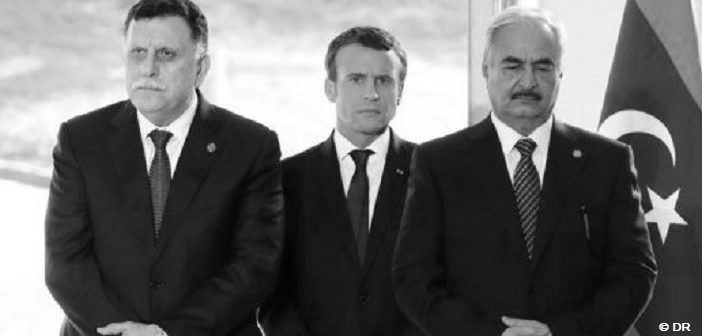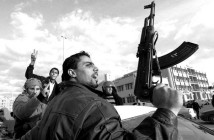Libya is a country in chaos; it could be even considered a failed state.
Civil war, terrorism and crime make stabilization efforts difficult. The endemic corruption prevents any kind of real progress; even in those parts of the country which are relatively stable. The UN-brokered Libya Political Agreement (LPA) process is stuck.
The paper, signed by a non-representative group of Libyans in December 2015, confirmed the role of the House of Representatives (HoR), which had been elected in June 2014, and established a Presidency Council, whose head Fayez al-Serraj is also the prime minister of the internationally recognized Government of National Accord (GNA).
Furthermore, an advisory body, the Supreme State Council (SSC) was created. It consists of members of the former General National Congress, Libya’s first elected interim parliament.
* * *
However, the GNA and prime minister al-Serraj, resident in the capital Tripoli since March 2016, are still not legitimized by the House of Representatives for various reasons. Equally important, while they are fully dependent on the mercy of mighty local militias for survival, much of the country is dominated by the controversial commander of the Libyan National Army, Marshall Khalifa Heftar.
Salame’s UN Action plan & Macron’s Paris summit
Current UNSR Ghassan Salame designed an Action Plan to unblock the process and end the transition phase after the revolution in four steps: modifying the LPA through negotiations between delegations from the HoR and the SSC, convening an inclusive national conference, approving the draft of the new constitution by referendum and finally organizing general elections. Regrettably, not even the first step has been achieved. During a summit in Paris on May 29, 2018, mediated by the French President Macron, it was declared by Serraj, Heftar and the heads of the HoR and SSC, that general elections will be held on December 10, 2018, anyway.
Unfortunately, Libya is not ready in any sense for parliamentary or presidential elections, neither political, nor organizational nor security-wise. If they are held anyway without the proper conditions in place, it is likely, that this will lead to an aggravation of the situation.
The 2014 elections
There is a precedent for this, the parliamentary elections in 2014. Libya entered that year with one government and one parliament.
Albeit weak, both were more or less recognized all over the country. Libya exited 2014 with two governments, two parliaments, and a civil war. In between, avote took place in June without a clear legal foundation and under difficult security circumstances in some parts of the country.
However, altogether the preconditions were certainly better than what exists today. Nevertheless, just about 1.5 million people had registered for the elections, and only 630.000 voted (14,6 % of the population in the voting age). Although the escalation in 2014 cannot be blamed only on the elections, they certainly contributed significantly.
Preconditions for successful elections
There are several preconditions for successful elections. Among them are a proper organization, a widely stable security environment, a sound legal foundation and a high voter turnout.
Security
Except for Marshall Heftar, none of the four participants of the Paris meeting can significantly contribute to protect the elections.
It is not really up to them, if there will be a safe and secure environment. Current and recent developments underline, that it will be extremely challenging to guarantee security. Battles are raging in Derna, the Oil Crescent and Sebha.
Terrorist attacks and counter terrorism operations take place in Tripoli, Benghazi, Ajdabiya, south of Bani Walid and Sirte as well as in Fezzan. Militias are de-facto in charge of many larger cities. Smuggling and human trafficking gangs widely control Libya’s borders. It cannot be expected, that the elections will be everywhere reasonable free and fair, without coercion or intimidation of voters and candidates.
Security for those intending to run, cannot be guaranteed, let alone for a country-wide election campaign. It is not even sure, that all those wanting to vote, can do so.
Legal foundation
If there is a real goodwill, it should be possible for the HoR to adopt the required election law in time. But a higher hurdle to clear will be the constitution.
The Constitution Drafting Assembly (CDA) was elected in 2014 by general elections. However, for various reasons, only part of its members participated in the meetings regularly, minorities stayed away at all. The whole process was significantly delayed. The draft finally presented in summer 2017 was heavily contested within the CDA.
It is a very weak compromise, imprecise in several important parts (e.g. about the source of legislation, no mentioning of the number of members of the future parliament) and very vague on decentralization. Libya’s Constitutional Declaration from 2011 foresees that the permanent constitution must be approved by referendum by a majority of two thirds of the voters. It is unlikely that this will be the case with the current draft.
Altogether, it is not realistic to have the new constitution in place in time for elections in December. Insisting on adopting it first is a good tool for those, who want to delay the whole process.
But the final constitution is not necessarily a precondition, as there is still the Constitutional Declaration, which provided already the framework for the previous elections. In order to keep the intended date, it would be a possibility to hold the vote under the Constitutional Declaration.
Another option would be to delay them for a couple of months and return to the old 1951/63 constitution in a slightly modified and amended versionfor an interim period.
Voter-turnout
Only if there would be a very high voter turnout and a landslide winner, elections could contribute to the stabilization of Libya, but, as the last two votes and the current registration process show, both are not very likely. Although the number of voters registered was praised by some diplomats, the figure is actually only about 2.4 million. Just less than one million are newly registered, the others are still in the list from the 2014 elections.
Keeping in mind, that Libya has at least 4.5 million people in the voting age and that a voter turnout of the registered voters on the election day of 50% would be already exceptional high, this means, that a minority of about 1.25 million Libyans would “decide” about the outcome.
Legitimacy of any government emerging from such elections will be limited. It is extremely likely, thatinstead of contributing to stabilizationthe results will be heavily contested, even if the four persons participating in the Paris meeting would accept it. Furthermore, there is information from some cities, that Islamists have quite successfully urged their followers to register, learning the lessons from 2014, when they by and large boycotted the elections. If all those people really vote, very positive results for Islamists candidates can be expected, even if they are in reality a minority.
Obviously, the necessity of a high voter turnouthad been also realized at the Paris meeting, as another registration period is planned. It needs to be seen, if a significant number of additional Libyans change their mind and use the renewed opportunity to register.
Probable developments
These circumstances lead to three probable developments. Most likely is a postponementof the elections, as Libya will not be able to create reasonable acceptable conditions to hold a votealready in December. Maybe it will be even endlessly postponed. This would lead to a continuation of the current slow, but steady descent into total chaos.
If the elections take place anyway, with a low voter turnout in a violent environment and no clear winner, the outcome will not be widely accepted. This could lead to an escalation of violence and the de-facto break-up of Libya.
If there are widely free and fair elections with a high voter turnout (clearly more than 50% of those eligible to vote), limited violence before and on the election day and a clear winner, this would contribute significantly to the stabilization of Libya, although work is far from done. Unfortunately, this is the least likely development.
* * *
Premature elections in Libya are a very risky endeavor. Keeping the developments of 2014 in mind, this could easily lead to an aggravation of the situation. There is the very concrete danger of a Somalization.
Libya could break-up in an uncontrolled way which would allow various radical Islamists to use parts of the country for their aggressive strategy well outside the borders of Libya.
If it is not possible to generate the proper conditions for a vote, it would be better to wait until they are there.
However, if the elections don’t take place and are endlessly postponed, it would be necessary for someone to come forward with a new, more realistic plan for stabilization early next year to stop Libya’s decline.





1 Comment
Dear Mr. Wilfgang..
I praise your endovor to observe and analyse the cobditions of Libya and try to generate solutions.
I fully agree with the three potential options to exit the current stalemate. However I think with some more time and effective intermediation between the partues, the third sceinareo could be realised whereby viable election could executed.
To acheive this objective, effective and honest reconiliations are to be conducted between the islamists and the milutary leaders starting from Hafter down to heads of some if the beneign militias that are supporting the GNA in Tripoli..one concent is plausibly established, I beleive election could be held. The consensus is to be based on two principles; allowing fair and free election and accepting its results. I strongly beleive that Libyans in all either sitizens and in influencial levels are hurt and ib despiration by the drastic warring sutuation and are looking for ways of this deadlock. And I am sure they would submit to any forward plan.
So, contrary to your last cobclusion, I beleive with some miticulous efforts Libya could make it to stability sooner..
Thank you.